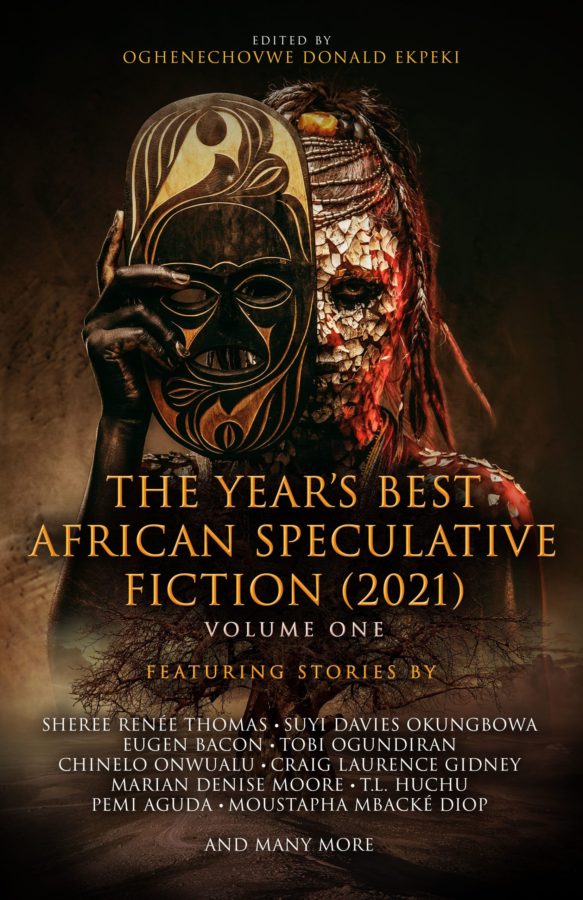Genre: Sci-Fi, Fantasy, Horror, Afrofuturism
Reviewer: Jim
Smashwords | iBooks | B&N | Kobo | Scribd | Gardners | Odilo | Goodreads
About The Book
The first ever Year’s Best African speculative fiction anthology with works from some of the most exciting voices in Africa and the diaspora, published in the 2020 year.
“Where You Go” by Somto O. Ihezue
“Things Boys Do” by Pemi Aguda
“Giant Steps” by Russell Nichols
“The Future in Saltwater” by Tamara Jerée
“The ThoughtBox” by Tlotlo Tsamaase
“The Parts That Make Us Monsters” by Sheree Renée Thomas
“Scar Tissue” by Tobias S. Buckell
“Ancestries” by Sheree Renée Thomas
“Breath of the Sahara” by Inegbenoise O. Osagie
“The Many Lives of an Abiku” by Tobi Ogundiran
“A Love Song for Herkinal as composed by Ashkernas amid the ruins of New Haven” by Chinelo Onwualu
“A Curse at Midnight” by Moustapha Mbacké Diop
“A Mastery of German” by Marian Denise Moore
“Are We Ourselves?” by Michelle Mellon
“When the Last of the Birds and the Bees Have Gone On” by C.L. Clark
“The Goatkeeper’s Harvest” by Tobi Ogundiran
“Baba Klep” by Eugen Bacon
“Desiccant” by Craig Laurance Gidney
“Disassembly” by Makena Onjerika
“The River of Night” by Tlotlo Tsamaase
“Egoli” by T.L. Huchu
“The Friendship Bench” by Yvette Lisa Ndlovu
“Fort Kwame” by Derek Lubangakene
“We Come as Gods” by Suyi Davies Okungbowa
“And This is How to Stay Alive” by Shingai Njeri Kagunda “The Front Line” by WC Dunlap
“Penultimate” by ZZ Claybourne
“Love Hangover” by Sheree Renée Thomas
“Red_Bati” by Dilman Dila
The Review
What is Africa?[1] What, and who, are “Africans”? And what, if anything, is African Speculative Fiction, or Afrofuturism?[2] These are worthwhile questions, and it’s fascinating to see emerging speculative fiction scenes in African nations.[3] While black SF emerged in the US, we see more and more good genre fiction from African and Caribbean authors.
What is Africa? Is “Afrofuturism” a valid tag for the work of Nicky Drayden? Of Pauline Hopkins? Of Samuel R. Delany? (The question isn’t an easy one to answer, but Nicky Drayden should write more novels.) When this reviewer discussed the book with Nisi Shawl (who sadly wasn’t invited to this antho), Shawl insisted that the key question is “What is [an?] African?”. Diaspora writers certainly use literature as a means of claiming their African heritage and Afrofuturism is one pathway to this.
The present volume features work from authors native to the Caribbean, Africa itself and other places. Summarizing the whole volume is impossible at this length. The reviewer wandered through the stories, noting common features in the shared “Africa” where the stories come to life. Mike Resnick’s Africa, borrowed from colonizers such as F.C. Selous and Karen Blixen, an Africa alive with hunting, plantations and patronized “natives”, is not in evidence.[4] The shared realm of these writers swarms with spirits, Ifa and other beliefs, grandmothers (one of them a “hologramma”[5]) and traditions. The fantasy outweighs the solid SF, which is not a problem, but some tales, such as “Egoli” by T.L. Huchu, are grounded solidly in Africa. There are several pieces of flash fiction, some puzzling, some good.
Any reader will have favorites. One was “After The Birds And The Beasts Have Gone On,” a short piece about a courier in a wild, dark world, by C.L. Clark, and Huchu’s “Egoli,” in which a vividly seen Zimbabwe coexists with spaceflight. Some could be expanded, and some improved. “Red_Bati” by Dilman Dili is a hard-SF tale of misfit-toy bots on a space “slave ship” that needs a better ending.
Some stories are dubious: “Baba Klep” by Eugen Bacon, with its band of human-sacrificing little people, is an unironic echo of decades of bad pulp adventure fiction starring racial stereotypes. And “Desiccant”, by Craig Gidney, while it has a well-drawn black trans* protagonist, is a tale of (alien?) Insect vampires in a US city. More vampires/sirens dance through Sheree René Thomas’ “Love Hangover”, set in the last days of New York disco, and drawing from Greek mythology. Notably few stories are set in the Arab world, the location of Effinger’s When Gravity Fails, and none in Madagascar, fascinating a place as it is.
Some stories play fascinating games with English, including traditional grammar and dialect; in some others, such as “Breath of the Sahara”, by Inegbenoise Osagie, the wording is simply odd: “The seven chiefs were present for my trial, hatted and seated on plush armchairs behind the king’s hand, who had a red left eye.” Who had an eye? Who didn’t? This reviewer is not sure. Africa, like Moscow, may be a state of mind as much as a place.
All in all, this book is a huge mixed grill of fantasy, horror, and honest-to-Heinlein SF. There’s good and promising work here as well as head-scratching confusion. Worth sampling, since all readers will like some of it, even if all readers don’t like all of it. Recommended.
This reviewer was not compensated for the review.
[1] The author sat through a terrific paper presentation on this topic by Alphine Jefferson, a professor of African Studies at Randolph-Macon University; to the best of his knowledge Jefferson has not published this work.
[2] Defined on wiki as including Parliament-Funkadelic, Herbie Hancock, Black Panther, and N.K. Jemisin; this aesthetic sounds fun.
[3] The present reviewer’s fascination with Onitsha and other market literature has not uncovered any genre works but Chaka, written in Sesotho in 1910, is a fictional look at the great Zulu warlord, available at http://www.suneo.mx/literatura/subidas/Thomas%20Mofolo%20Chaka%20(en%20ingl%C3%A9s).pdf
[4] Neither Resnick nor Jemisin, the two most decorated writers mentioned here, is in the present volume.
[5] The pun was irresistible. Forgive me.
The Reviewer
J. Comer is a writer and teacher who lives in Texas.


